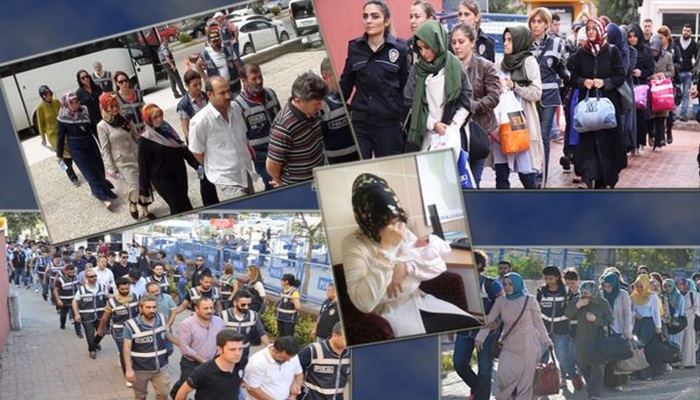Turkey has escalated the mass detention of people over alleged links to the Gülen movement, ordering the detention of 69 individuals in new wave of crackdowns on the movement.
According to the Kronos news website, the İstanbul Public Prosecutor’s Office on Thursday issued detention warrants for 34 former employees of Kaynak Holding, which was seized by the government in November 2015 due to its alleged links to the Gülen movement, a faith-based group accused by the government of “terrorist” activities. The police conducted operations across Turkey and detained 28 of the suspects.
Turkey’s Savings Deposit Insurance Fund (TMSF) has took over major conglomerates including Kaynak Holding, Naksan Holding, Dumankaya, Boydak Holding and the Koza Ipek Group among 880 other private companies following a coup attempt on July 15, 2016.
Twelve people including teachers, lawyers and businessmen were also detained on Wednesday in three provinces as part of investigation by the İzmir Chief Public Prosecutor’s Office that also included active duty and dismissed military officers and former military cadets.
As part of an investigation launched by the Mersin Chief Public Prosecutor’s Office, detention warrants were issued on Thursday for 28 former military cadets. Some of them were accused of using ByLock, an encrypted messaging app used on smartphones that used to be available on Apple’s App Store and Google Play. Turkish police detained 23 of the suspects.
The same day, six people were also detained by security forces in western Turkey as they attempted to flee to Greece.
President Recep Tayyip Erdoğan has been targeting followers of the Gülen movement, inspired by Turkish Muslim cleric Fethullah Gülen, since the corruption investigations of December 17-25, 2013, which implicated then-prime minister Erdoğan, his family members and his inner circle.
Dismissing the investigations as a Gülenist coup and conspiracy against his government, Erdoğan designated the movement as a terrorist organization and began to target its members. He intensified the crackdown on the movement following an abortive putsch that he accused Gülen of masterminding. Gülen and the movement strongly deny involvement in the coup attempt or any terrorist activity.
The ByLock messaging app, once widely available online, is considered by the government to be a tool of secret communication among supporters of the movement. The UN Human Rights Council’s Working Group on Arbitrary Detention (WGAD) has repeatedly stated that arrest and conviction based on ByLock use in Turkey violated Articles 19, 21 and 22 of the International Covenant on Civil and Political Rights.
Following the coup attempt, the Turkish government declared a state of emergency and carried out a massive purge of state institutions under the pretext of an anti-coup fight. More than 130,000 public servants, including 4,156 judges and prosecutors, as well as 24,706 members of the armed forces, were summarily removed from their jobs for alleged membership in or relationships with “terrorist organizations” by emergency decree-laws subject to neither judicial nor parliamentary scrutiny.
In addition to the thousands who were jailed, scores of other Gülen movement followers had to flee Turkey to avoid the government crackdown.
Source:Stockholm Center for Freedom (SCF)



